African and Afrodiasporic Mobilities and Identities
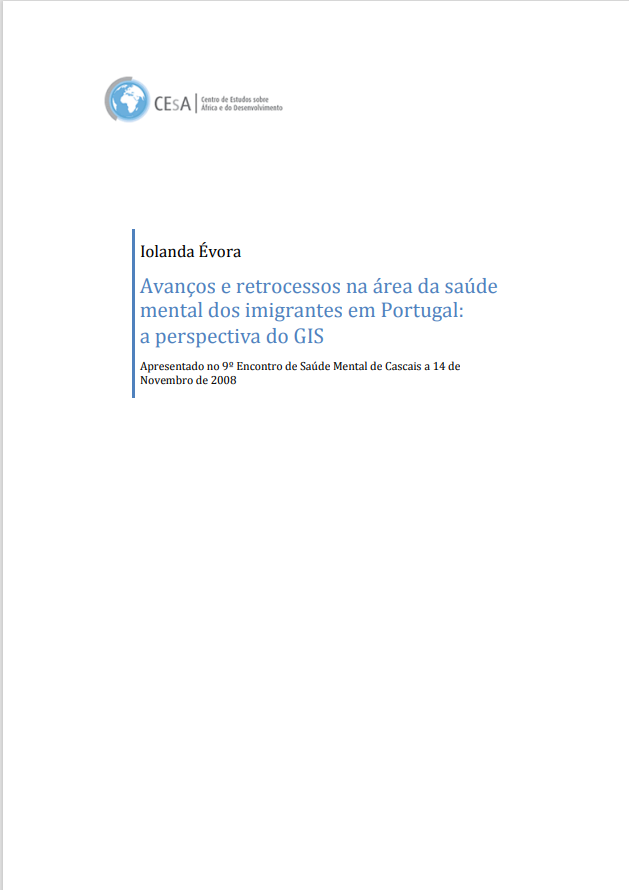
Avanços e Retrocessos na Área da Saúde Mental dos Imigrantes em Portugal: A perspectiva do GIS
Abstract:
The GIS Association (formally called Salpisign-GIS Association) is a non-profit association dedicated to research, service delivery and intervention in the area of migration and health. We focus on migrants, refugees and ethnic minorities, as well as on the quality of health services and intercultural training of health workers. In our action, we see the access to health as a fundamental right of an inclusive society in the expression of the rights and duties of citizenship. The GIS Association was created in 2007 and consists of 7 members (coincidentally, all female: anthropologists, social psychologists, sociologists and philosophers) and works in collaboration with other professionals and researchers, according to projects under development. The GIS Association – Immigration and Health Group has as its main objective the promotion of the health of the migrant population, through the development of research, training and intervention actions, through the creation of scientific, technical and informative dialogues between the Medical Sciences, the Social Sciences and Humanities and the socioculturally constituted knowledge of the immigrants and refugees themselves. Avanços e retrocessos na área da saúde mental dos imigrantes em Portugal: a perspectiva do GIS was presented at the 9th Cascais Mental Health Meeting on 14.11.08
Quotation:
Évora, Iolanda. 2011. “Avanços e retrocessos na área da saúde mental dos imigrantes em Portugal: a perspectiva do GIS”. Comunicação apresentada no 9º Encontro de Saúde Mental, Cascais.
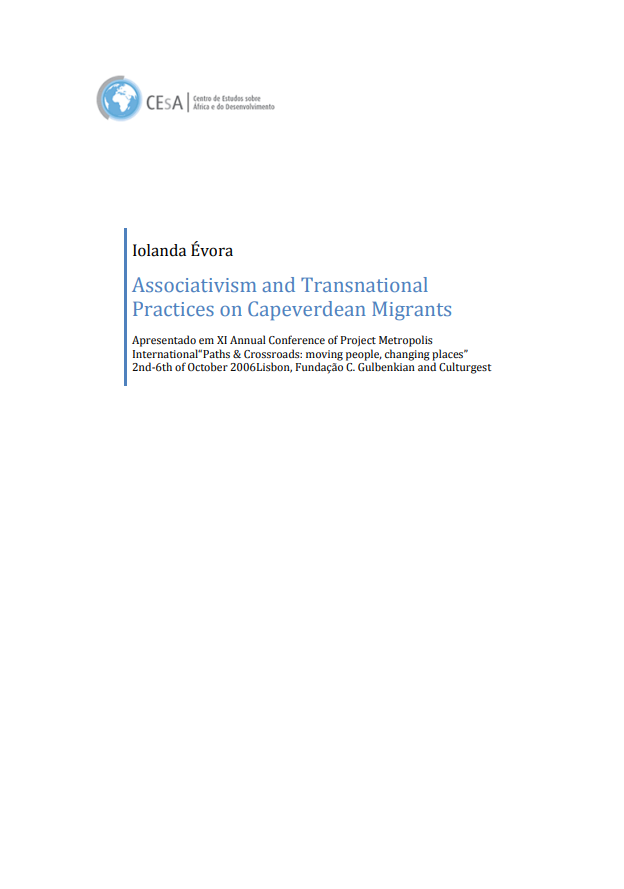
Associativism and Transnational Practices on Capeverdean Migrants
Abstract:
In Associativism and Transnational Practices on Capeverdean Migrants”. Comunicação apredentada na XI Annual Conference of Project Metropolis International “Paths & Crossroads: moving people, changing places we propose a reflection on the role that the Capeverdean immigrant associations have towards the intensification of transnational practices in the Capeverdean community. We consider that transnationalism as a characteristic per excellence of the contemporary Capeverdean migration creates a change in the goal set by associations which are traditionally involved either by defending the origin of the identity or by social inclusion from the place of destiny. We reached the conclusion that transnational immigrants are not yet identified in their specific needs by associative organizations. However, studies have demonstrated that like transnational collective strategies such as the Congresso de Quadros Cabo-verdianos da Diáspora for example, transnational practices of the small immigrant supported by informal networks of a more spontaneous character are also an important sign of the passing of a Diaspora to a transnational community alloying to identify the practice of an active migratory culture and the appeal to an accumulated migratory knowledge which aids the implementation of intense and frequent types of circulation and contact amongst the different Diaspora cores.
Quotation:
Évora, Iolanda. 2011. “Associativism and Transnational Practices on Capeverdean Migrants”. Comunicação apredentada na XI Annual Conference of Project Metropolis International “Paths & Crossroads: moving people, changing places”, Fundação C. Gulbenkian and Culturgest,Lisbon.
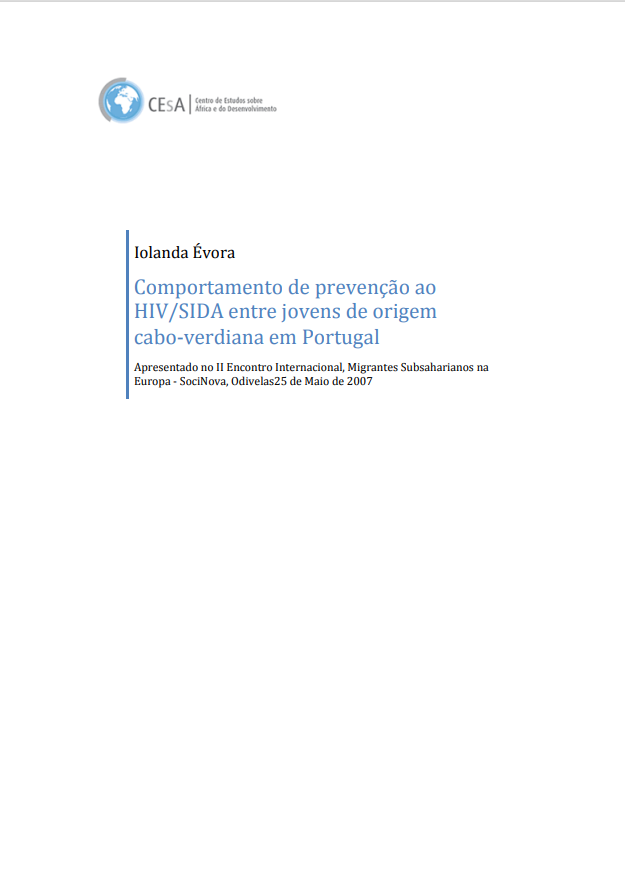
Comportamento de prevenção ao HIV/SIDA entre jovens de origem cabo-verdiana em Portugal
Abstract:
This study that we carried out, and whose partial results are presented here, deals with the prevention behavior of the young Cape Verdean population immigrated to Portugal in relation to HIV/AIDS. The promoters of Comportamento de prevenção ao HIV/SIDA entre jovens de origem cabo-verdiana em Portugal were two Cape Verdean institutions: the Ministry of Foreign Affairs and the Cape Verde AIDS Coordination Committee, sponsored by the World Bank. The aim of this study was to understand the relationship (or gap) between the knowledge that young people have about HIV/AIDS and their day-to-day prevention practices. Likewise, we tried to explore the possible interferences of the immigration factor in the attitudes and theories of young people about HIV/AIDS and the behaviors they consider the safest. The study is, therefore, among those that seek to support health education proposals related to HIV/AIDS, based on the understanding of the way in which different populations or communities conceive health care. The study was carried out with young people of Cape Verdean origin living in Portugal, whether or not they were born in Cape Verde. We cover both sexes equally (8 men and 7 women), aged between 16-26 years and living in social relocation neighborhoods, that is, neighborhoods built by municipal structures to replace slums. The regions covered were those with a large number of Cape Verdeans and their descendants: Lisbon, Greater Lisbon and Loulé. We believe that belonging to such spaces circumscribes the social and economic situation of this group because, although questionable, the definition of rehousing neighborhoods contains a social categorization, to a large extent, attributed by the dominant social classification system to young people of immigrant origin in the country. Therefore, we consider this definition because of its implications in the social experience of these young people and in the material and symbolic conditions of existence, on which daily decisions regarding health care and prevention depend. We chose to use a qualitative methodology for data collection that would allow for an in-depth exploratory study and the identification of certain patterns of behavior and perception. This methodology, developed by Rodrigues (1978, 1999) seemed to us to be more suitable for reaching irrational contents, a name that is often attributed by the social sciences to factors that “exist, but cannot be apprehended by reason” (Rodrigues, 1999, p.4). ). As the author says, it is about trying to achieve “what cannot be measured, but which is worth knowing”, that is, the emotional contents and deeper meanings of young people’s explanations about preventive behaviors in relation to HIV/AIDS. We carried out in-depth individual interviews in order to lead the subjects to produce material capable of revealing the representations, the type of perception, the explanatory resources used and the explanations they produce, based on the positions they occupy within their groups, in particular, the position on immigration and HIV/AIDS. Based on self-reflection (free speech), we identified the themes of interest and concern of each young person interviewed, the sequence of themes and the way in which the young person interconnects aspects of his life and his world. Above all, we sought to recognize the place where subjects place the issue of AIDS among the themes of their lives. With the Intermediate Questions, we proposed in Comportamento de prevenção ao HIV/SIDA entre jovens de origem cabo-verdiana em Portugal to explore the issues about HIV/AIDS that were of interest to the project and that had not been brought up, spontaneously, by the young person in the first part of the free speech. Finally, the Socio-Economic Questionnaire made it possible to reach the living conditions of this group in Portugal and also their family history. Here we include questions about the migration of your family group in its different stages and for each of its members.
Quotation:
Évora, Iolanda. 2011. “Comportamento de prevenção ao HIV/SIDA entre jovens de origem cabo-verdiana em Portugal”. Comunicação apresentada no II Encontro Internacional, Migrantes Subsaharianos na Europa, SociNova, Odivelas.
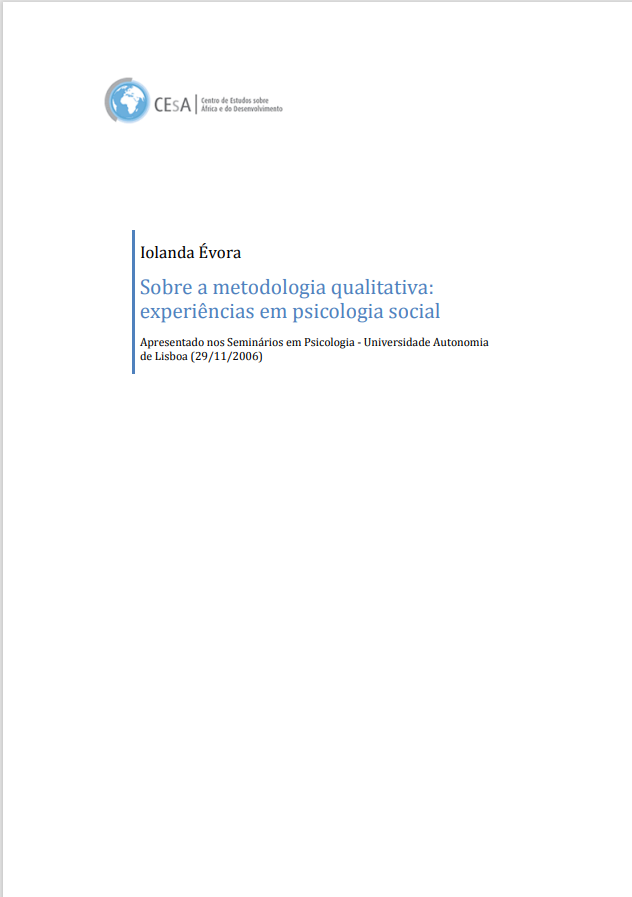
Sobre a Metodologia Qualitativa: Experiências em psicologia social
Abstract:
Often, the reference to qualitative methodology leads us to the great controversy about the scientificity of the social sciences in comparison with the natural sciences and to doubts about the attribution of the status of “science” to the social field, studied in Sobre a metodologia qualitativa: experiências em psicologia social. There are those who argue that this attribution (of scientificity) will only be possible if the same procedures are applied to the social that are used to understand the natural. For others, on the contrary, the important thing is to claim the total difference and specificity of the human field and to show that the work for the knowledge of the social must reach the symbolic, historical and concrete orders. In the symbolic dimension, the meanings of the subjects are included; the historical dimension – of time consolidated in the real and analytical space – includes the fact that social actors resort to their experience and memory to recompose facts that took place within their temporality. The concrete dimension is related to the structures and social actors in relation. Hence the statement that the social sciences deal with phenomena marked by relativity, unpredictability and specificity.
Quotation:
Évora, Iolanda. 2011. “Sobre a metodologia qualitativa: experiências em psicologia social”. Comunicação apresentada nos Seminários em Psicologia, Universidade Autonomia de Lisboa
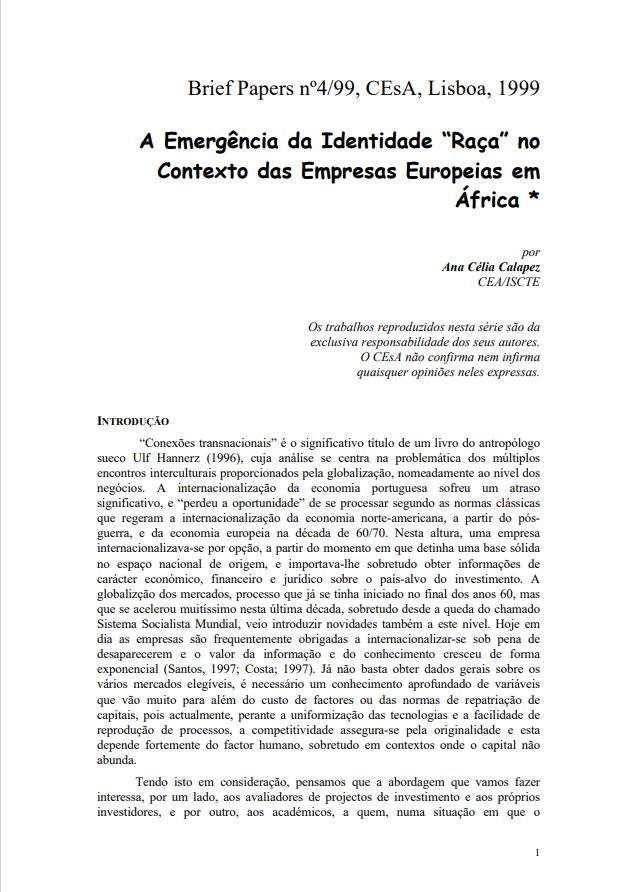
Brief Paper 4/1999: A emergência da identidade “Raça” no contexto das empresas europeias em África
Abstract:
Transnational Connections” is the significant title of a book by the Swedish anthropologist Ulf Hannerz (1996), whose analysis focuses on the problem of the multiple intercultural encounters which globalisation provides, namely at the business level. The internationalisation of the Portuguese economy suffered a significant delay and “missed the opportunity” to follow the classic rules which governed the internationalisation of the North American economy, from the post-war period, and of the European economy in the 60s and 70s. At that time, a company internationalised by choice, as soon as it had a solid base in its home country, and it was mainly important for it to obtain economic, financial and legal information on the target investment country. The globalisation of markets, a process that had already begun at the end of the 1960s, but which has greatly accelerated in the last decade, especially since the fall of the so-called World Socialist System, has also introduced innovations at this level. Nowadays, companies are often obliged to internationalise themselves or risk disappearing and the value of information and knowledge has grown exponentially (Santos, 1997; Costa; 1997). It is no longer enough to obtain general data on the various eligible markets, it is necessary to have in-depth knowledge of variables that go far beyond the cost of factors or the rules of repatriation of capital, because today, in the face of the standardisation of technologies and the ease of reproduction of processes, competitiveness is ensured by originality and this depends heavily on the human factor, especially in contexts where capital is not abundant. A emergência da identidade “Raça” no contexto das empresas europeias em África (The emergence of the “Race” identity in the context of European companies in Africa) was prepared for a paper on race at the CEsA 1999 Seminar: The problematic of development – history and current contributions from a transdisciplinary perspective, Conference on Strategic Identities for Development in Sub-Saharan Africa: gender and race, 23rd June 1999.
Quotation:
Calapez, Ana Célia. 1999. “A emergência da identidade “Raça” no contexto das empresas europeias em África”. Instituto Superior de Economia e Gestão – CEsA Brief papers nº 4-1999
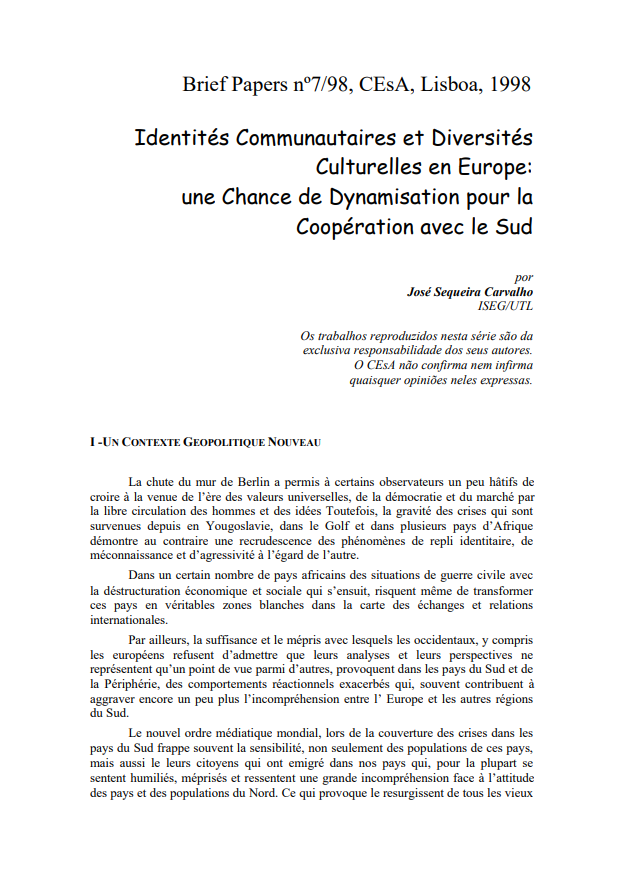
Brief Paper 7/1998: Identités Communautaires et Diversités Culturelles en Europe: Une chance de dynamisation pour la coopération avec le Sud
Abstract:
In Identités Communautaires et Diversités Culturelles en Europe: Une chance de dynamisation pour la coopération avec le Sud we talk about how the fall of the Berlin Wall allowed some rather hasty observers to believe in the arrival of an era of universal values, democracy and market through the free circulation of people and ideas. However, the gravity of the crises that have occurred since then in Yugoslavia, the Gulf and several African countries show, on the contrary, a resurgence of the phenomena of identity withdrawal, misunderstanding and aggression towards the other. In a number of African countries, civil war situations with the resulting economic and social destructuring may even transform these countries into veritable white zones on the map of trade and international relations. Moreover, the presumption and contempt with which Westerners, including Europeans, refuse to admit that their analyses and perspectives represent only one point of view among others, provoke in the countries of the South and of the periphery, exacerbated reactionary behaviours that often contribute to further aggravate the lack of understanding between Europe and other regions of the South. The new world media order, in covering the crises in the countries of the South, often touches the sensibilities not only of the populations of these countries, but also of their citizens who have emigrated to our countries, who, for the most part, feel humiliated, scorned and feel a great lack of understanding of the attitude of the countries and populations of the North. This causes the resurgence of all the old disputes, including psychopathological disputes, between ethnicities, religions and communities of different origins.
Quotation:
Carvalho, José Sequeira. 1998. “Identités communautaires et diversités culturelles en Europe : une chance de dynamisation pour la coopération avec le Sud”. Instituto Superior de Economia e Gestão – CEsA Brief papers nº 7-1998.
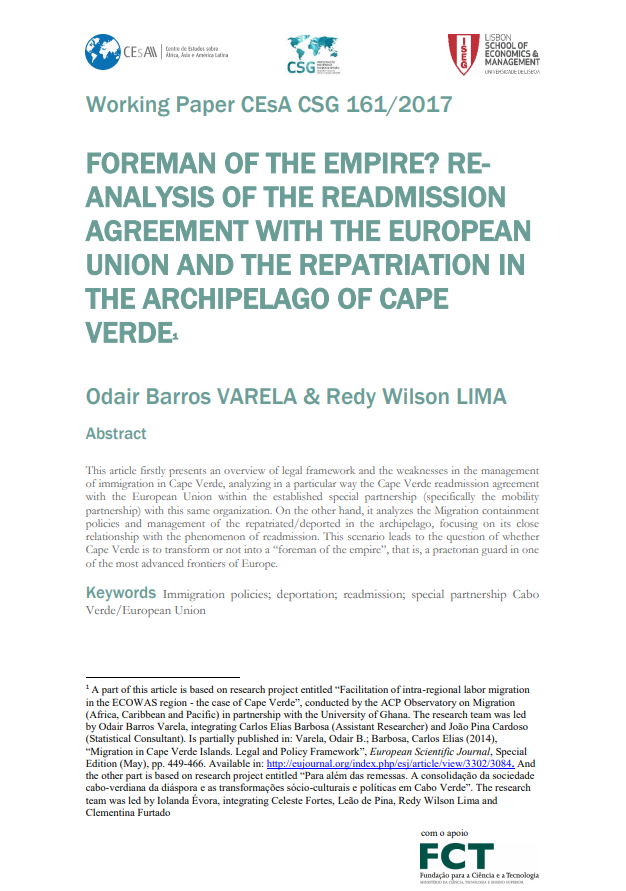
Working Paper 161/2017: Foreman of the Empire? Re-analysis of the readmission agreement with the European Union and the repatriation in the archipelago of Cape Verde
Abstract:
This article firstly presents an overview of legal framework and the weaknesses in the management of immigration in Cape Verde, analyzing in a particular way the Cape Verde readmission agreement with the European Union within the established special partnership (specifically the mobility partnership) with this same organization. On the other hand, it analyzes the Migration containment policies and management of the repatriated/deported in the archipelago, focusing on its close relationship with the phenomenon of readmission. This scenario leads to the question of whether Cape Verde is to transform or not into a “foreman of the empire”, that is, a praetorian guard in one of the most advanced frontiers of Europe. Trying to understand the complexity of migration to Cape Verde Island, one should also highlight the historical importance of links on the mobility of people, which played a key role in disseminating information and contacts between the pre-colonial societies. It should also refer to the implications of European colonial process in migration dynamics in the African continent, with the delineation of borders, through the recruitment of work force, or by using strategies for planning political and administrative control of the populations.
Quotation:
Varela, Odair Barros e Redy Wilson Lima (2017). “Foreman of the Empire? Re-analysis of the readmission agreement with the European Union and the repatriation in the archipelago of Cape Verde”. Instituto Superior de Economia e Gestão – CEsA/CSG – Documentos de Trabalho nº 161/2017.





